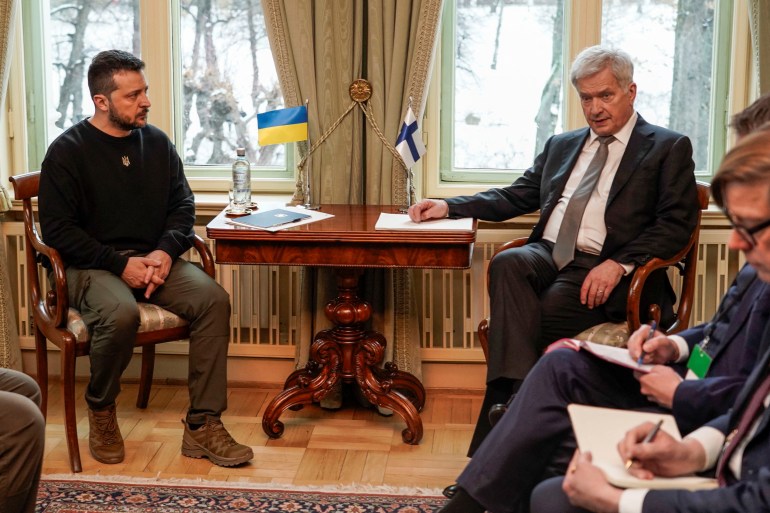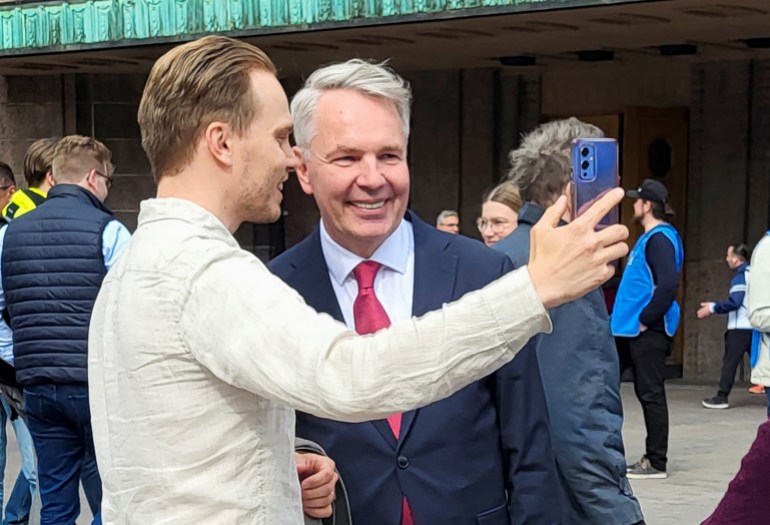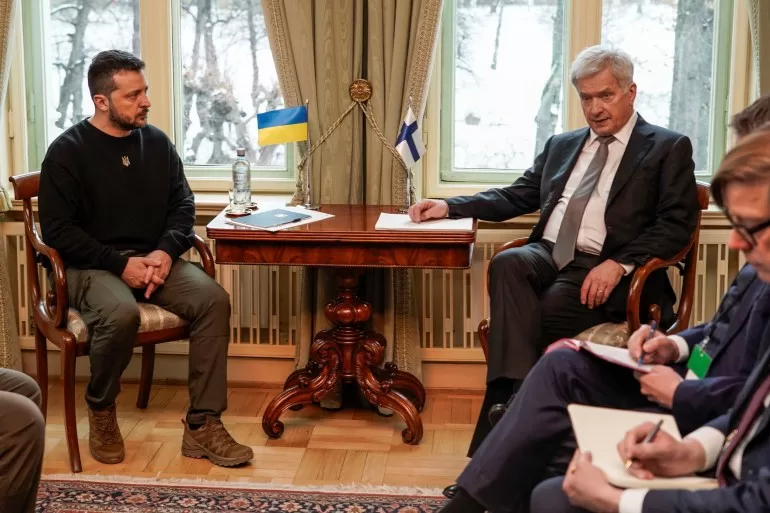The Nordic nation controls the European Union’s longest border with Russia and is one of a handful of EU members to have fought a war with Russia.
Its position on Ukraine has been outspokenly and consistently against Russia’s invasion, and it has been a leading provider of armaments and training to the Ukrainian military.
Finland is also one of the most successful economies in the world. Its population of 5.5 million people produces a gross domestic product (GDP) of $283bn, earning just under $51,000 per capita – putting it in the top two dozen countries worldwide.
Its frontier geography, liberal democratic values, economic health and support for Ukraine make the Northern European country a standard bearer of Western positions and social and institutional strength on the border with Russia.
Its presidential election on Sunday, with a possible second round on February 11, will decide which hopeful will take over from Sauli Niinisto, a conservative who has served two six-year terms.
Why does the presidency matter?
Finland’s prime minister runs the executive branch of government, but the Finnish president remains directly responsible for defence and foreign policy, as articulated in sections 58 and 93 of the constitution.
The president is the commander-in-chief of the military and decides military appointments.
It is the president who attends NATO summits and declares war and peace. In their foreign policy capacity, presidents also address the United Nations and meet with foreign leaders.
The president works with competent government ministers and parliament to ratify Finland’s international treaties, meaning the institution of the presidency is not merely ceremonial.
Its portfolio concerns matters governing Finland’s relationship with the rest of the world.
Why does this particular election matter?
The foreign and defence aspects of the presidency become even more important during a major changing of the guard.
The outgoing Niinisto is not constitutionally allowed to run for a third term, so Finns have to elect their first new head of state in 12 years. While this is unlikely to mean a wild change in foreign and defence policy, the next president will have to decide some key issues.

Ukraine is interested in adopting Finland’s ageing F-18 Hornet combat aircraft once Finland’s air force takes possession of its new F-35s. There’s an ongoing debate about whether Finland can afford to let them go.
Former Prime Minister Sanna Marin got into trouble for suggesting that Finland could deliver the planes at a time when its F-35s had not been delivered and incorporated into the air force.
The presidency is also changing due to Russia’s war in Ukraine.
“His main task used to be bilateral relations with Russia, but now the position changes because there’s not much left of those relations. So the question is, how does the presidency change? Does [the president] now become a NATO president? And the consensus seems to be yes,” Minna Alander, a research fellow at the Finnish Institute of International Affairs, told Al Jazeera.
Finland’s election may also be an opportunity to gauge in which direction European politics are going ahead of European Parliament elections scheduled to take place across the continent in June.
In last year’s parliamentary elections, Finns ousted the Social Democrat-led government, which campaigned on higher spending for health and education, in favour of a centre-right administration that argued for fiscal discipline and more nuclear energy.
How does the system work, and who are the frontrunners?
To win outright and assume office on February 1, a candidate must garner more than half the valid votes cast on Sunday.
If no one achieves that majority, a run-off will be held between the two frontrunners on February 11. The winner would assume office on March 1. Advance voting opened on January 17.
Recent opinion polls have put former Prime Minister and centre-right National Coalition Party candidate Alexander Stubb in the lead with 24 percent of the vote, followed by former Foreign Minister and Green Party candidate Petri Haavisto at 21 percent. They lead a field of nine candidates representing all the major parties.

Stubb’s popularity is underlined by his high campaign funds, which are comprised of donations and Stubb’s party, companies and foundations.
A political scientist and currently director of the European University Institute in Florence, Stubb has been a liberal voice in the centre-right European People’s Party (EPP) during two decades in European and national office.
As a candidate for the EPP leadership in 2018 (which went to Germany’s Manfred Weber) and the European Commission presidency in 2019 (which went to Germany’s Ursula von der Leyen), he supported gender equality and rule of law.
He spoke out against illiberalism in the EPP, suggesting the suspension of Viktor Orban’s Fidesz party in Hungary as a member of the group for its Eurosceptic stance, suppression of free media and manipulation of the judiciary. The EPP, he said, was a “pro-European” party and should adopt a “zero tolerance” stance against illiberalism.
In an interview in 2018, Stubb said he was running for commission president because he believed European values, such as human rights, equality, tolerance, rule of law and liberal democracy, were “under threat at this particular moment from outside of the union, from inside of the union and perhaps from inside of the EPP as well”.
Stubb was a member of the European Parliament from 2004 to 2008, served as foreign minister from 2008 to 2011, minister for Europe from 2011 to 2014 and as prime minister from 2014 to 2015.
His National Coalition Party lost its first place in elections held in April 2015. Stubb served as finance minister until 2016 when he lost the party leadership to Petteri Orpo.
Why did Finland recently close its borders with Russia?
As foreign minister in Marin’s cabinet in September 2022, Pekka Haavisto, the Green’s hopeful, led a reform to restrict visas to Russian tourists to prevent Finland from becoming a transit country for Russians fleeing army conscription.
“There is no moral or ethical basis for allowing Russian tourism to continue as normal. We have often raised this issue in the EU,” Haavisto said.
The resulting reform allowed Finland to close its borders with Russia, something that proved especially popular late last year when Russia sent asylum seekers to the Finnish border to overwhelm its asylum system in an effort to create an immigration emergency that would put pressure on the government.
“Even the left-wing party candidates are not criticising the decision to close the border and keep it closed,” Alander said. “Even here there is consensus. … Since the 2015-16 first [refugee] border crisis, it was understood there was a gap in Finnish border legislation.”
In November, Haavisto was leading Stubb by seven points in opinion polls.
He has made two previous attempts at the presidency, in 2012 and 2018, losing to Sauli Niinisto both times.
